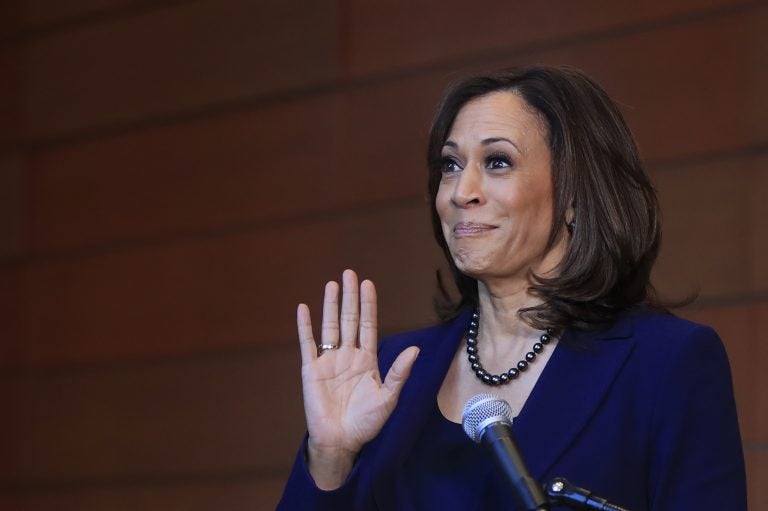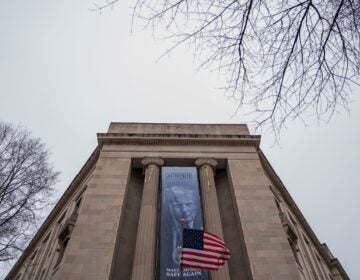Can Kamala Harris flunk the perfection test and still win the nomination?
The freshman California senator, who announced her presidential bid on Monday, has already made history.

Sen. Kamala Harris, D-Calif., speaks to members of the media at her alma mater, Howard University, Monday, Jan. 21, 2019 in Washington, following her announcement earlier in the morning that she will run for president. Harris, a first-term senator and former California attorney general known for her rigorous questioning of President Donald Trump's nominees, entered the Democratic presidential race on Monday. Vowing to "bring our voices together," Harris would be the first woman to hold the presidency and the second African-American if she succeeds. (Manuel Balce Ceneta/AP Photo)
Confucius reputedly said, “Better a diamond with a flaw than a pebble without.” Voltaire reputedly said, “The best is the enemy of the good.” We contemporaries typically say, “Don’t let the perfect be the enemy of the good.”
It’s all sage advice for grassroots Democrats, who are already busy cherry-picking the various perceived flaws of their prospective presidential candidates. Kirsten Gillibrand is a phony liberal with a pro-gun anti-immigrant track record; Joe Biden as a senator voted for a mass incarceration law and sucked up to the credit card companies; Elizabeth Warren’s style is arguably “too divisive“; Bernie Sanders is trying to take down Beto O’Rourke because Beto doesn’t endorse Bernie’s ‘Medicare for All” … oh man. Just wait until everyone shows up for the first scheduled debate in June.
I doubt whether anyone can ace the perfection test, especially — and most intriguingly — Kamala Harris.
The freshman California senator, who announced her presidential bid on Monday, has already made history; this is the first time that a black female former prosecutor has ever sought to win the White House. The Democratic base is presumably fine with the fact that she’s a black female, if only because black females are the most loyal voters in the Democratic base. But the fact that she’s a former prosecutor — San Francisco district attorney, California attorney general — is definitely less than perfect.
Witness the heat she’s already taking on Twitter, where many liberals and black activists are dismissing her with a single sentence: “She’s a cop.” Or sometimes this sentence: “She worked for The Man.”
Dare I say that it would be nice if Democrats can keep their eye on the prize — ousting the worst excuse for a president in American history — and not muddy their mission by flunking qualified candidates whose track records are less than ideologically pristine?
Harris, who touts herself as a “progressive prosecutor,” took a hit six days ago when California law professor Lara Bazelon argued that Harris, as state attorney general, had taken tough-on-crime stances that hurt the minority community. For instance, “When a federal judge in Orange County ruled that the death penalty was unconstitutional in 2014, Ms. Harris appealed … In 2014, she declined to take a position on Proposition 47, a ballot initiative approved by voters, that reduced certain low-level felonies to misdemeanors … In 2015, she opposed a bill requiring her office to investigate shootings involving officers. And she refused to support statewide standards regulating the use of body-worn cameras by police officers.”
All true, as far as it goes. But Lateefah Simon, a civil rights activist who once worked for Harris, subsequently urged grassroots Democrats to “look at the totality of her record.” She said that Harris “pioneered job training for nonviolent, first-time offenders. This didn’t just mean helping those who were formerly incarcerated. It diverted young people who were largely arrested for crack offenses into jobs, substance abuse treatment and apprenticeship programs, and got them housing and health care.” (Even Bazelon acknowledged that this program was “successful.”) Simon also said that Harris “made her officers wear body cameras … She demanded that data on in-custody deaths and police shootings be made public to ensure accountability.” Harris, in prosecutorial mode, also fought for sexual assault victims and for homeowners hurt by the Great Recession’s foreclosure crisis.
But what’s missing, in this instant debate to assign her an imperfection grade, is an understanding of what it was like for a black female to serve as a district attorney and attorney general. What we need is a little perspective. Even as Harris took progressive positions when possible, she also had to navigate California’s large tough-on-crime constituency, which was instinctively suspicious of a black female as prosecutor.
Feminist journalist Jill Filipovic says it well: “Harris was balancing demands and expectations that are not put quite so squarely on the shoulders of white men. As ‘a woman who is a minority who is anti-death penalty’ (her words), she faced significant hostility in her job and during her campaigns from police unions and the law-and-order types in her state, including Sen. Dianne Feinstein. Harris is now criticized for being too deferential to existing authority in her work. That may be true — but it may also be true that she simply had less space to be unrestrained.”
Plus, as attorney general, she was tasked with defending state decisions. On Monday, within hours of announcing her candidacy, she was asked at a press conference to explain why she had defended a California Department of Corrections’ decision to prevent transgender inmates from getting gender reassignment surgery. (You’ll never hear questions like that at a GOP candidate’s press conference.) She replied: “I had a host of clients that I was obligated to defend and represent. I couldn’t fire my clients, and there were unfortunately situations that occurred where my clients took positions that were contrary to my beliefs … The buck stops with me and I take full responsibility for what my office did.”
Without endorsing Harris as a candidate — because I have no favorite in the early field — I’ll simply suggest that her primary season prospects in heavily white Iowa and New Hampshire (the first two voting states) might actually be enhanced by the fact that she served in prosecutorial posts. A black female candidate may be a heavy lift for some voters (take a guess why), but a black female who prosecuted crime may reassure some voters. Plus, there are other potentially favorable factors: She hits the liberal mark on climate change, Medicare for All, and gun reform. “The buck stops with me” sets up a character contrast with a fake president who takes responsibility for nothing. And, as a member of the Senate Judiciary Committee, her grilling of Trump nominees is arguably proof that she could go toe to toe with Trump in debates.
Who knows, maybe all the aspirants would be viable against Trump, whose current job approval rating is 37 percent. But grassroots Democrats will only damage the mission if they bury candidates like Harris for the sins of imperfection. In the words of the sage political analyst William Shakespeare, “Striving to better, oft we mar what’s well.”
WHYY is your source for fact-based, in-depth journalism and information. As a nonprofit organization, we rely on financial support from readers like you. Please give today.




